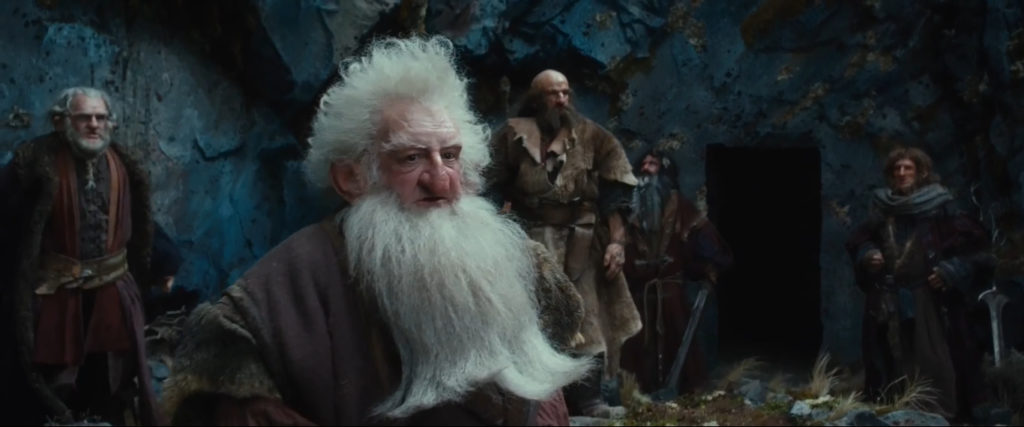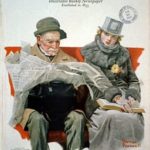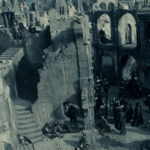‘The Hobbit’ Story Group 11: On The Doorstep
As I write this more than a month before publication on SpecFaith, I’m eight chapters into a very different kind of fantasy: Amish Vampires in Space. I’m enjoying it for many reasons including this one: unlike many other books with even less flagrant “does what it says on the tin”-style titles, the author is taking his time setting up an epic confrontation.1
Though the genres are slightly different, this is exactly what Tolkien does in this chapter. In fact, non-fans often charge The Lord of the Rings with being too slow. But The Hobbit seems immune to this criticism. Only in this chapter, I’ve found, is Tolkien taking his time.
Yet the chapter is not very long. Neither are my reading-group questions. By design, this is a prelude — little character development, little dialogue, just movement of Tolkien’s cast from point Lake-town to point Mountain-door. Thus I can’t help but wonder which modern critics would say this is exactly the sort of material you should leave out of a story. Nothing is going on, they’d say. Or: Too slow here. Insert some romance/action, or else cut it out.
However, how would The Hobbit sound, and what pictures would the story leave, without just this slow buildup to the very location to which the story has been leading all along?
People are starting to wake up and grumble about films that start too quickly on the back of a galloping horse, but then don’t ever care to dismount for coffee and snacks around the campfire. I think the grumblers are right. Too many beloved, classic stories break this new “rule” favoring constant story-starter action. Yes, they have their “hooks,” but then just as quickly they slow down to let audiences stroll about and breathe the airs of this new world.
Star Wars famously starts with the iconic great-Empire-ship-blasting-rebel-ship scene —then lands quietly on a desert planet to follow too slow droids and one normal young man.
The Fellowship of the Ring book begins with an encyclopedic introduction to its central species: “Concerning Hobbits.” Its 2001 film adaptation added some galloping Orcs and Elves and Men in its prologue, but then, like Star Wars, is happy to spend time in The Shire.
Last year The Hobbit: An Unexpected Journey followed the same format, with elderly Bilbo’s recollection of the Dwarves’ history and Smaug’s arrival, then much time in The Shire. Fans loved it. Or rather, fans should have loved it. A few didn’t; I fear they listened overmuch to critics acting like six-year-olds hopped up on sugar stix, who said: Who cares for the Shire? We want action! Stupid Peter Jackson just dragging things out to fleece audiences, etc., etc.
So I say: Critics suggesting the same about any faithful adaptation of chapter (Stop dragging and get to the dragon!) can get shoved down the creepy tunnel inside Smaug’s cave first.
Chapter 11: On the Doorstep
- Read chapter 11 in its entirety.
- It was easier to believe in the Dragon and less easy to believe in Thorin in these wild parts. (page 189) Any meaning here — something about “belief”? Or a coincidence?
- How do you feel about “slower” parts of the story, as we find here while the Dwarves finally approach the Lonely Mountain? Do you grow impatient waiting for the story to pick up, or appreciate the slower pace of the story that’s building to a finish, or both?
- [Balin] looked both sad and grim as he said this: he had been one of Thorin’s companions on the day the Dragon came. (page 191) Having “met” Balin already in the book, and seen him differently in The Hobbit film(s), or even (spoiler!) having seen his tomb in The Fellowship of the Ring, how might this brief aside help deepen his character?
 How do you feel, gazing with Bilbo and Balin on the entrance to the Dragon’s lair, seeing the steam and dark smoke and hearing the occasional harsh croak of a bird (page 191)?
How do you feel, gazing with Bilbo and Balin on the entrance to the Dragon’s lair, seeing the steam and dark smoke and hearing the occasional harsh croak of a bird (page 191)?- Do you find it easy or hard to follow Tolkien’s descriptions of the door (on page 192)?
- [Bilbo] had a queer feeling that he was waiting for something. “Perhaps the wizard will suddenly come back today,” he thought. (page 196) After the many times Gandalf has bailed out the Dwarves and the hobbit at the last moment, how does this strike you? How might that give the lie to the accusation (which some have made) that Gandalf’s earlier bailouts of the Dwarves are deus ex machina cheats? (Hint: the entire story does not have that ending, and the earlier “bailouts” make the finale more unexpected.)
- In case you were wondering, this confrontation will be between Amish and vampires, in space. ↩













































“So I say: Critics suggesting the same about any faithful adaptation of chapter (Stop dragging and get to the dragon!) can get shoved down the creepy tunnel inside Smaug’s cave first.”
LOL! I’m in full agreement! That tunnel would outdo any amusement park ride…